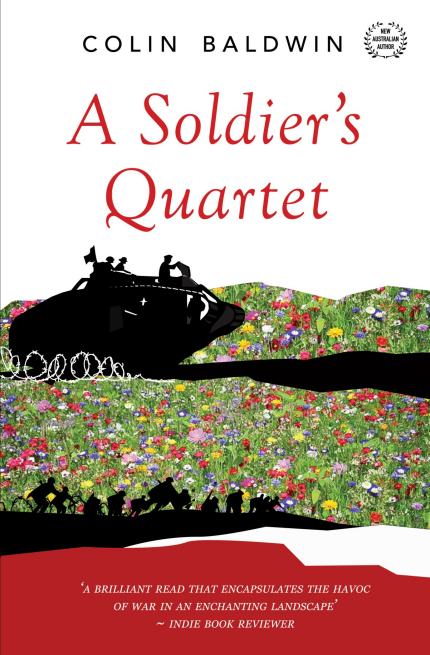A Soldier’s Quartet, by Colin Baldwin

A Soldier’s Quartet by Colin Baldwin
My rating: 2 of 5 stars
DNF at 58%… I really hoped I would like “A Soldier’s Quartet” by Colin Baldwin but it was not to be for a lot of reasons.
First of all, we’re jumping around in time as if we were Doctor Who’s new companion – from 1918 to 2018 to 1914 and so on and on… This is not only confusing and exhausting, it actually wastes the chance to actually make us care about the German soldier Wolf who first dies and only later do we get insight into some of his life before.
Also, the narration about Conrad’s contemporary research into the letter doesn’t really work for me: It’s a thinly veiled memoir of Colin’s endeavours and it feels entirely authentic (including some “classic” German habits and traditions) – but, to me, it’s just not very interesting. A lot of it would totally work and amaze me if told briefly and anecdotally in person. Not so much as a book, though.
There’s also at least one instance in which a lot of story is told – only to be summarised immediately afterwards in a dialogue between Conrad and his neighbour Wally. This made no sense at all story-wise and intrinsically felt weird – would you make your neighbour summarise what you’ve told them over the fence for the last few weeks?
At least part of the writing was (sometimes literally) extremely flowery and over the top:
»Suddenly, the flowers reverted to the colours of war. He was infuriated by their trickery. They turned and took aim, delivering a crushing blow. He felt powerless to defend himself.«
Last but not least, I really disagree with some fundamental assumptions, ideas and wording: Chapter ten is called “1914. Germany Enters The Great War”. No, Germany didn’t enter it, Germany caused World War 1. They most likely didn’t want the war but they knowingly accepted the risk of a global war and fought it as long as they possibly could.
»It is my belief, the young men mentioned in this letter, and all soldiers who died in the war, have no voice in history. I now wish to give them a chance to speak.«
And that’s the second issue: No, I strongly disagree with that statement. Twice my country has tumbled the world into the horrors of global wars. Twice its young men fought for their respective leader and their country. They were proud to fight, in very many cases they volunteered to fight. In both world wars they fought, committed war crimes and so on.
I’m saying: No, the German soldiers deserve no voice. They do not deserve the many memorials all over Germany either. What they did needs to be remembered, who they were may be forgotten. I’m stating this as one whose own grandfather died as a soldier in World War 2. His name shall be forgotten.
There are some truths about Europe that I’d like to highlight, though:
»When it’s the language, culture and friendship that bind us, borders and walls become irrelevant.«
That is absolutely true and with the Schengen Area, (most of) Europe has grown together like never before. For the purpose of travelling the borders are practically gone. I’ve travelled in Europe before the treaty of Schengen of 1995 and it was a dream come true when the borders peacefully fell away…
»One blink of an eye and you wouldn’t even know you’ve crossed a border!«
Even after all these years whenever I cross the border into my beloved France, I cry because there’s nothing that prevents me from visiting the country in friendship that my own Germany has fought against not even 80 years ago…
(At least I cry if I even notice I crossed the border because in the border regions between the German state of Rhineland-Palate and French Alsace, there often simply is no discernible border!)
So, all in all, I cannot help but rate this book at two out of five stars. I still encourage you to read this book if you’re interested in World War 1 – my conviction is, of course, highly subjective and your mileage may differ.
Nichts für ungut, Colin, and I hope we can stay friends!
Ceterum censeo Putin esse delendam
View all my reviews